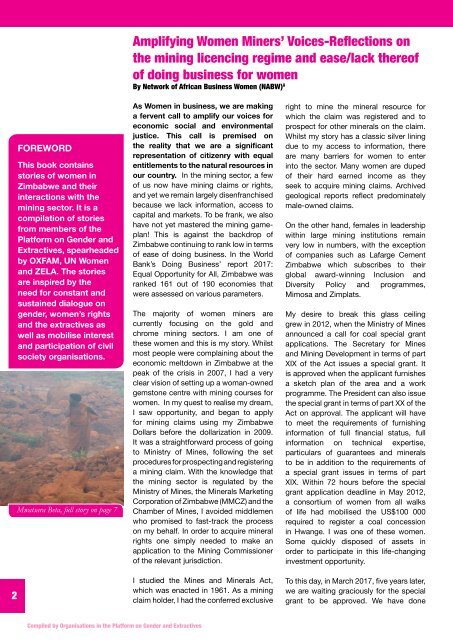EXTRACTIVES IN ZIMBABWE
genderExtractives
genderExtractives
Create successful ePaper yourself
Turn your PDF publications into a flip-book with our unique Google optimized e-Paper software.
Amplifying Women Miners’ Voices-Reflections on<br />
the mining licencing regime and ease/lack thereof<br />
of doing business for women<br />
By Network of African Business Women (NABW) ii right to mine the mineral resource for<br />
2<br />
FOREWORD<br />
This book contains<br />
stories of women in<br />
Zimbabwe and their<br />
interactions with the<br />
mining sector. It is a<br />
compilation of stories<br />
from members of the<br />
Platform on Gender and<br />
Extractives, spearheaded<br />
by OXFAM, UN Women<br />
and ZELA. The stories<br />
are inspired by the<br />
need for constant and<br />
sustained dialogue on<br />
gender, women’s rights<br />
and the extractives as<br />
well as mobilise interest<br />
and participation of civil<br />
society organisations.<br />
Mwatsara Beta, full story on page 7<br />
As Women in business, we are making<br />
a fervent call to amplify our voices for<br />
economic social and environmental<br />
justice. This call is premised on<br />
the reality that we are a significant<br />
representation of citizenry with equal<br />
entitlements to the natural resources in<br />
our country. In the mining sector, a few<br />
of us now have mining claims or rights,<br />
and yet we remain largely disenfranchised<br />
because we lack information, access to<br />
capital and markets. To be frank, we also<br />
have not yet mastered the mining gameplan!<br />
This is against the backdrop of<br />
Zimbabwe continuing to rank low in terms<br />
of ease of doing business. In the World<br />
Bank’s Doing Business’ report 2017:<br />
Equal Opportunity for All, Zimbabwe was<br />
ranked 161 out of 190 economies that<br />
were assessed on various parameters.<br />
The majority of women miners are<br />
currently focusing on the gold and<br />
chrome mining sectors. I am one of<br />
these women and this is my story. Whilst<br />
most people were complaining about the<br />
economic meltdown in Zimbabwe at the<br />
peak of the crisis in 2007, I had a very<br />
clear vision of setting up a woman-owned<br />
gemstone centre with mining courses for<br />
women. In my quest to realise my dream,<br />
I saw opportunity, and began to apply<br />
for mining claims using my Zimbabwe<br />
Dollars before the dollarization in 2009.<br />
It was a straightforward process of going<br />
to Ministry of Mines, following the set<br />
procedures for prospecting and registering<br />
a mining claim. With the knowledge that<br />
the mining sector is regulated by the<br />
Ministry of Mines, the Minerals Marketing<br />
Corporation of Zimbabwe (MMCZ) and the<br />
Chamber of Mines, I avoided middlemen<br />
who promised to fast-track the process<br />
on my behalf. In order to acquire mineral<br />
rights one simply needed to make an<br />
application to the Mining Commissioner<br />
of the relevant jurisdiction.<br />
I studied the Mines and Minerals Act,<br />
which was enacted in 1961. As a mining<br />
claim holder, I had the conferred exclusive<br />
which the claim was registered and to<br />
prospect for other minerals on the claim.<br />
Whilst my story has a classic silver lining<br />
due to my access to information, there<br />
are many barriers for women to enter<br />
into the sector. Many women are duped<br />
of their hard earned income as they<br />
seek to acquire mining claims. Archived<br />
geological reports reflect predominately<br />
male-owned claims.<br />
On the other hand, females in leadership<br />
within large mining institutions remain<br />
very low in numbers, with the exception<br />
of companies such as Lafarge Cement<br />
Zimbabwe which subscribes to their<br />
global award-winning Inclusion and<br />
Diversity Policy and programmes,<br />
Mimosa and Zimplats.<br />
My desire to break this glass ceiling<br />
grew in 2012, when the Ministry of Mines<br />
announced a call for coal special grant<br />
applications. The Secretary for Mines<br />
and Mining Development in terms of part<br />
XIX of the Act issues a special grant. It<br />
is approved when the applicant furnishes<br />
a sketch plan of the area and a work<br />
programme. The President can also issue<br />
the special grant in terms of part XX of the<br />
Act on approval. The applicant will have<br />
to meet the requirements of furnishing<br />
information of full financial status, full<br />
information on technical expertise,<br />
particulars of guarantees and minerals<br />
to be in addition to the requirements of<br />
a special grant issues in terms of part<br />
XIX. Within 72 hours before the special<br />
grant application deadline in May 2012,<br />
a consortium of women from all walks<br />
of life had mobilised the US$100 000<br />
required to register a coal concession<br />
in Hwange. I was one of these women.<br />
Some quickly disposed of assets in<br />
order to participate in this life-changing<br />
investment opportunity.<br />
To this day, in March 2017, five years later,<br />
we are waiting graciously for the special<br />
grant to be approved. We have done<br />
Compiled by Organisations in the Platform on Gender and Extractives


